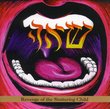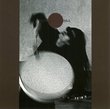| All Artists: Ikue Mori Title: Hex Kitchen Members Wishing: 1 Total Copies: 0 Label: Tzadik Original Release Date: 6/20/1995 Re-Release Date: 5/23/1995 Genres: Jazz, Special Interest, Pop, Rock Styles: Avant Garde & Free Jazz, Experimental Music Number of Discs: 1 SwapaCD Credits: 1 UPC: 702397720126 |
Search - Ikue Mori :: Hex Kitchen
 | Ikue Mori Hex Kitchen Genres: Jazz, Special Interest, Pop, Rock
|
Larger Image |
CD DetailsSimilar CDs
|
CD ReviewsMemento Mori waldglyde | Sydney, New South Wales Australia | 04/05/2001 (5 out of 5 stars) "Ikue Mori's 'Hex Kitchen' is - for want of a better word - very Tzad-ic. For those of us for whom the price the search for musical originality comes at is (John Zorn's) eternal vigillance, the word Tzadik conjures up noise of a particularly confrontative, and exciting, type. From Hajimi and Eye's computerised scream, sustained for 18 minutes on the 'Nani Nani' album, to Yasunao Tone's self-explanatory 'Solo for Wounded Cd', or the beautiful free-form Japanese pop of Hoaiho, Tzadik music manages both emotional and intellectual impact. Ikue Mori is deconstructing Jazz and classical, rather than Rock, traditions, but at this extreme of deconstruction it scarcely matters. Mori's compositions, based around the shifting rhythms and overlays of sound of samplers triggered by drum machines, can be beautiful, but usually settle for distorted, atonal and alienating. The counterpointing of differing rhythms, apparently alleatory sounds, and disconcertingly wistful vocals, particularly on 'Woke Up Aghast' and 'Dau Miu', sound like an Ornette Coleman ensemble wrestling over their instruments with the Boredoms.But for Mori, and for this listener, all of these facts are positives. This is music that reflects the nature of urban life in terms of its juxtapositions of harshness, sadness, quasi-melodicism and freedom. All of which is viewed through that interestingly dissociated sensibility that she shares with other Japanese avant-gardists such as Jon and Satoko Fujii. Most of us no longer expect our films, novels or poetry to be purely conventionalised and 'prettified', we want somethingdarker and more realistic. Yet when it comes to music, we still expect a simplistic rhythm to underpin a neat organisation of sound. Jazz, and Rock, are traditions that seem to break a little from this, but the tyrannies of structure are observed by all but a few. It is important, then, that Zorn's New York label, Tzadik, is continuing a tradition of experimental Japanese music in that city. Yoko Ono, before she moved from the Big Apple to that Beatle-Riddled Apple, and her then-husband Toshi Ichyanagi, along with Ay-O and Mieko Shiomi, were part of the Fluxus movement of the early 1960s. Its deliberate breaking of the boundaries between media - and between music and performance, and music and noise - was an extension of John Cage's work. Mori is very much within this tradition, or battle. Having said all of this I should mention that most people will hate this. As an adolescent, growing up with Punk and New Wave, I always had a simple test to determine what I liked - I played it to my mother. However much she hated it, I liked it. Rather than a scale of 1-10, I used a scale of Blondie to Yoko Ono, Ono being the extreme of hatred. On that scale this is about 1 1/2 Yokos, and just for that Mori deserves to be noticed and remembered."
|

 Track Listings (11) - Disc #1
Track Listings (11) - Disc #1


